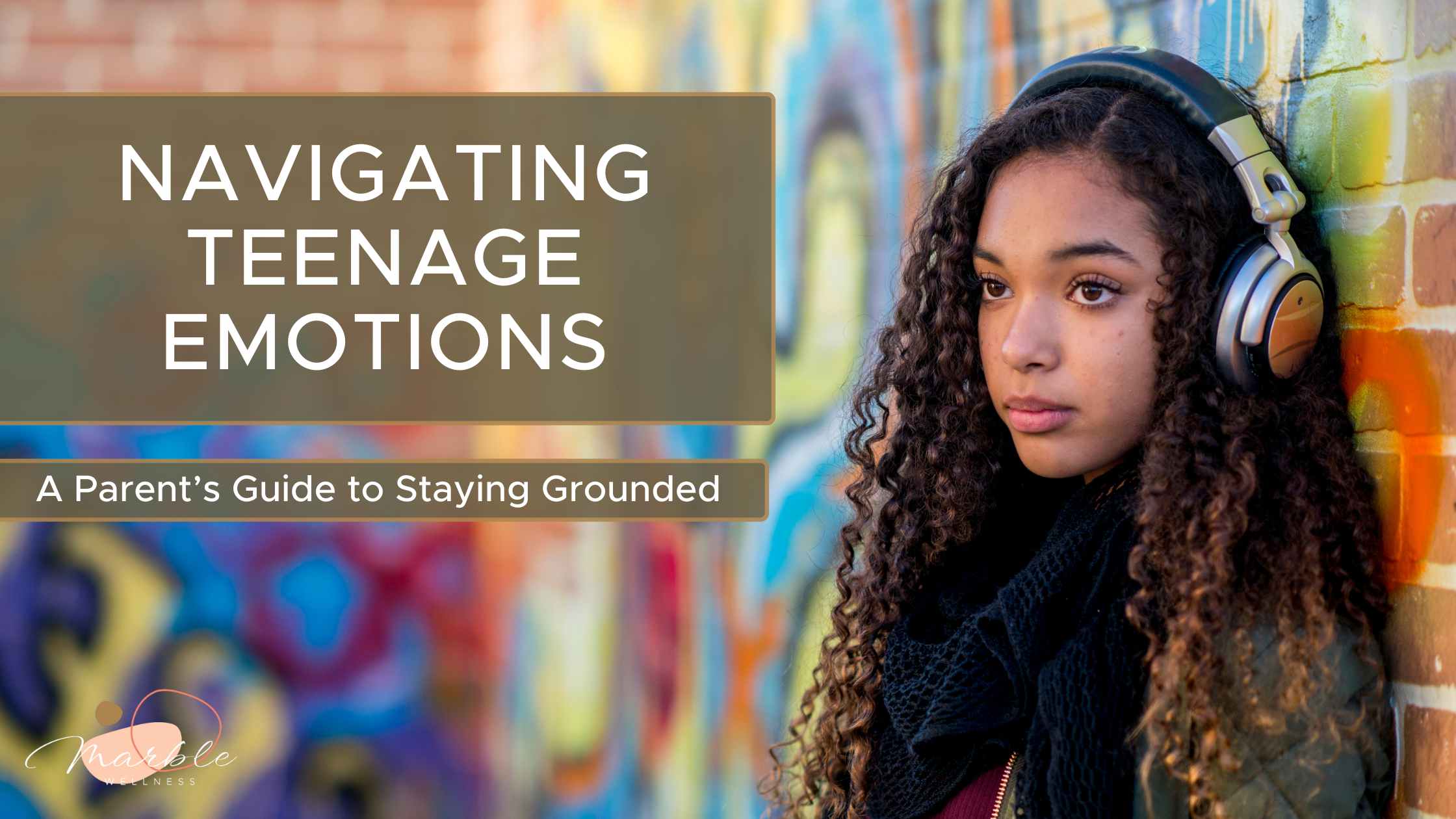You’re on the receiving end of rolled eyes, sighs that indicate how ridiculous you are, and constant exasperated tones no matter what approach you try. Sound familiar? Parenting a teenager can feel like you’re speaking a completely different language. One full of emotional tripwires. One moment, they’re talking your ear off about their favorite show or a friend’s latest drama, and the next, they’re shutting down completely. It’s tough, and honestly, it can be a little overwhelming.
But take a deep breath—you’re not alone. The teenage years are filled with emotional highs and lows, and as a parent, it’s important to understand that your teen’s behavior, while challenging, is normal. The emotions they’re experiencing are very real, and as frustrating as it can be, they are often struggling to understand and express these feelings themselves.
In this blog, we’ll explore how you, as a parent, can not only survive the emotional rollercoaster of raising a teen but thrive in it. (Is that pushing it too far, parents? You’ll gain insight into why teens act the way they do and how you can build stronger connections with your teen by learning to respond with empathy and patience. Let’s dive in.
Why They Act the Way They Do: Understanding Your Teen’s Emotional World
Parenting teens can be perplexing, especially when it feels like they’re on a rollercoaster of emotions. To understand why your teen is acting the way they are, it’s helpful to remember that this stage of life is one of rapid growth—physically, emotionally, and socially. Teens are navigating a complex developmental period, and much of their behavior, while frustrating at times, is actually a natural part of becoming more independent. Here’s a closer look at some of the key factors at play.
1. Hormones: The Emotional Rollercoaster
It’s not just mood swings—hormones are a major player in your teen’s emotional world. As they experience puberty, their bodies are flooded with hormones like testosterone and estrogen. These hormones influence everything from sleep patterns to emotional regulation, leading to more intense feelings.
- What’s happening: Hormonal changes can make teens feel more irritable, sensitive, or even overly emotional. They may react more strongly to situations that might not seem like a big deal to you.
- What this means for you: While it’s easy to chalk up their behavior to “just hormones,” it’s important to validate their feelings. Teens often feel like their emotions are out of control (though they’ll never say it and might not consciously recognize it), and acknowledging that this is a natural part of growing up can be comforting.
- What you can do: Show empathy. Instead of brushing off their emotional responses, try saying, “I know you’re feeling a lot right now—can we talk about it?” This helps create a space for them to feel heard.
2. Individuation: The Push for Independence
As teens start to separate from their families and establish their own identities, they go through a process called “individuation.” This is a normal, healthy stage of development where they begin to assert their independence and make their own decisions. It’s also how they learn *who* they are: likes and dislikes; values; social tendencies; etc.
- What’s happening: Teens start to question the values, rules, and beliefs they’ve grown up with. They want to find their own way, which often leads to conflicts with parents.
- What this means for you: While it can be tough to see your teen reject your advice or opinions, it’s actually a sign that they’re growing into their own person. They may push boundaries to test their autonomy and see where they fit in the world.
- What you can do: Allow space for their independence without compromising your role as a parent. Set clear, reasonable boundaries but give them the opportunity to make choices within those limits. A little freedom can go a long way in maintaining a strong connection.
3. The Comparison Trap: Pressure to Measure Up
Teens are constantly comparing themselves to others, whether it’s their peers, celebrities, or even social media influencers. This comparison often feels like a constant pressure to measure up in ways that can feel overwhelming.
- What’s happening: Social media and the internet fuel the idea that everyone else has it “better” or “easier.” Teens are exposed to filtered, curated versions of others’ lives, and this can lead to feelings of inadequacy.
- What this means for you: Your teen may struggle with body image, academic pressure, or feeling like they’re not “cool enough.” The fear of missing out (FOMO) can be intense, especially when they feel like they’re not living up to others’ expectations.
- What you can do: Be mindful of how you approach comparisons. Instead of reinforcing negative self-talk, help them recognize their unique strengths. Encourage self-compassion and make it clear that it’s okay to be imperfect. Discussing real-life scenarios (including your own struggles or mistakes) can help normalize the process of growing and learning.
4. Social Development: A New World of Friendships
During the teenage years, friendships become incredibly important. Teens may prioritize their social lives over their family connections, which can feel like a rejection of your relationship.
- What’s happening: Peer relationships are a significant part of teen development. Teens seek approval and validation from their friends, which can sometimes lead to conflict at home.
- What this means for you: It’s not unusual for teens to argue with parents over things like curfews, phone usage, or social plans. The desire to “fit in” and be accepted by their peers can drive these conflicts.
- What you can do: Respect their friendships and give them space to develop socially. However, it’s also important to set healthy boundaries around these relationships. Encourage positive social experiences and make sure your teen understands the value of true friendship, one based on mutual respect rather than peer pressure.
5. Cognitive Development: The Brain Isn’t Fully Wired Yet
A teen’s brain is still developing, particularly the parts that govern impulse control, decision-making, and emotional regulation. The frontal cortex, responsible for reasoning and thinking ahead, doesn’t fully mature until the mid-20s.
- What’s happening: Teens may act impulsively or without thinking of the consequences. They might react strongly to things that feel minor to adults, or they may make rash decisions.
- What this means for you: This lack of fully developed impulse control can make your teen appear reckless or emotionally unstable. Their behavior may feel like a “switch” that flicks between moods quickly.
- What you can do: Help them navigate these emotions by guiding them through problem-solving techniques. Rather than punishing impulsive behavior, focus on discussing the consequences of their actions in a calm, thoughtful way. Over time, this will help your teen develop better decision-making skills.
Parenting Strategies: How to Support Your Teen Through Their Emotional Rollercoaster
Understanding why your teen is behaving the way they are is an important first step, but knowing how to respond is where the real work happens. The key is to remain calm, patient, and consistent in your approach, even when things feel intense. Here are some parenting strategies to help you support your teen through their emotional journey:
1. Use Active Listening While Emotions are Shared
Teens want to feel heard, even if they don’t always express it in a way that makes sense to you. Active listening means really hearing what they’re saying, without interrupting, judging, or offering solutions immediately.
- What to do: When your teen opens up, put down distractions (like your phone) and give them your full attention. Show empathy by saying things like, “That sounds really tough” or “I can see how that made you upset.”
- Why it helps: Active listening allows your teen to feel understood, even if you don’t always agree with them. This strengthens the bond and fosters more open communication over time.
2. Set Clear and Consistent Boundaries
While independence is crucial for your teen, they still need boundaries to feel safe and secure. Clear expectations and consistent consequences help provide structure in a time when they might be testing their limits.
- What to do: Set rules that are fair, and explain the reasoning behind them. For example, “I know you want to stay out late, but I expect you to be home by 10 PM so we can all rest and prepare for tomorrow.”
- Why it helps: Consistent rules help teens feel grounded, even if they push back. When they understand the “why” behind your decisions, they are more likely to respect them in the long run.
3. Stay Calm During Emotional Outbursts
When your teen’s emotions are running high, it can be easy to react with frustration or anger. However, responding in a calm, measured way will help you both manage the situation more effectively.
- What to do: If your teen is upset, take a deep breath and let them express their feelings. Instead of arguing or raising your voice, say, “I can see you’re really upset right now. Let’s talk about this when we’re both calm.”
- Why it helps: Staying calm models emotional regulation for your teen, and it helps you both avoid saying things you might regret later.
Self-Care: The Essential Ingredient for Parents of Teens
Parenting a teenager requires energy—physically, mentally, and emotionally. But how can you be there for your teen when you’re running on empty? Taking care of yourself is not a luxury; it’s essential. Here’s how you can prioritize self-care during these years:
Make Time for Yourself
It’s easy to get caught up in the whirlwind of your teen’s life, but it’s crucial to carve out time for your own hobbies, rest, and personal interests.
- What to do: Schedule regular “me time” in your calendar—whether that’s reading a book, going for a walk, or even taking a nap. Don’t feel guilty for needing time away from your teen.
- Why it helps: When you take care of your physical and mental well-being, you have more patience and energy to handle the ups and downs of parenting.
Practice Stress-Relief Techniques
When parenting a teen, stress is inevitable. That’s why it’s important to have stress-relief techniques that work for you. Meditation, deep breathing exercises, and yoga can all help lower your stress levels.
- What to do: Try to incorporate relaxation techniques into your daily routine. Even five minutes of deep breathing can help you feel calmer and more centered.
- Why it helps: Stress-management practices help you stay emotionally resilient, even in tough situations. They allow you to respond to your teen’s emotional needs with a level head.
Using Your Support System: Leaning on Others for Strength
No one should go through parenting alone. Having a solid support network—whether it’s your partner, extended family, or close friends—can make all the difference.
Lean on Your Partner
If you have a partner, it’s essential to share the parenting load and be on the same page when it comes to your teen. Having consistent strategies at home will help your teen feel like they can trust both of you.
- What to do: Discuss strategies for handling different situations, like curfews or social activities, and agree on the boundaries you want to set together. Support each other in your roles as parents.
- Why it helps: Parenting together strengthens your bond as a couple and ensures consistency in your teen’s environment. You both need to be a united front when it comes to tough decisions.
Seek Outside Emotional Support: Therapy and Community
It’s okay to ask for help. Whether it’s family therapy or simply confiding in a friend, external support is vital when navigating the teen years.
- What to do: Consider attending family therapy to work through communication struggles or emotional conflicts. Or, lean on friends or support groups for advice and reassurance.
- Why it helps: Therapy for teens, and family therapy in general, or even individual therapy for you as a parent, can provide tools for managing difficult situations and emotional responses. It’s an investment in your relationship with your teen and your own well-being.
Emotional Resilience: Why It’s Key to Parenting During These Years
The teen years will test your patience, but emotional resilience is one of the most important qualities you can develop as a parent.
- What’s happening: Teens may lash out, push boundaries, or seem distant, and it’s easy to take these behaviors personally. But their emotions are often about them, not you.
- What to do: Build emotional resilience by reminding yourself that your teen’s behavior is part of their developmental journey. Stay grounded and compassionate, and allow yourself to stay calm even when it feels challenging.
- Why it helps: When you practice emotional resilience, you model healthy emotional responses for your teen. It helps both of you move through tough situations with more grace.
The Long Game of Parenting Teens
Raising a teenager isn’t always easy, but by employing these strategies, prioritizing your own well-being, and leaning on your support network, you’ll be better equipped to navigate the emotional highs and lows. While it may feel like an uphill battle at times, remember that family therapy can be an incredibly helpful tool in strengthening relationships, improving communication, and finding solutions to challenges as a team. Through patience, empathy, and resilience, you’ll create a stronger bond with your teen, no matter how tough the road gets.
Teens, Parents, and Caregivers: Consider Therapy in the St. Louis Area!
If you live in the St. Louis metro area and are ready to improve your mental health, our expert St. Louis therapists are here to help. We have therapy for teens, counseling for moms of teens, family therapy, couples therapy, and parent coaching…all potentially great options for families navigating the complexities of teenage emotions. We’ve got you, wherever you want to start.
Contact Us!
Learn About Our Group Offerings

Additional Counseling Services at Marble Wellness in St. Louis, MO
Our counseling services are designed to help set you on a path of living a more fulfilled, calm, and happy life. Our incredible team of STL-based therapists has a variety of training backgrounds and areas of expertise. We specialize in anxiety, depression, grief, chronic illness, therapy for men, couples, and maternal overwhelm. Our practice also helps new moms with various postpartum concerns, moms in the thick of parenting, and moms with teens. We can also chat from wherever you are in the state with online therapy in Missouri. No matter where you are in your mental health journey, we would love to support you.



